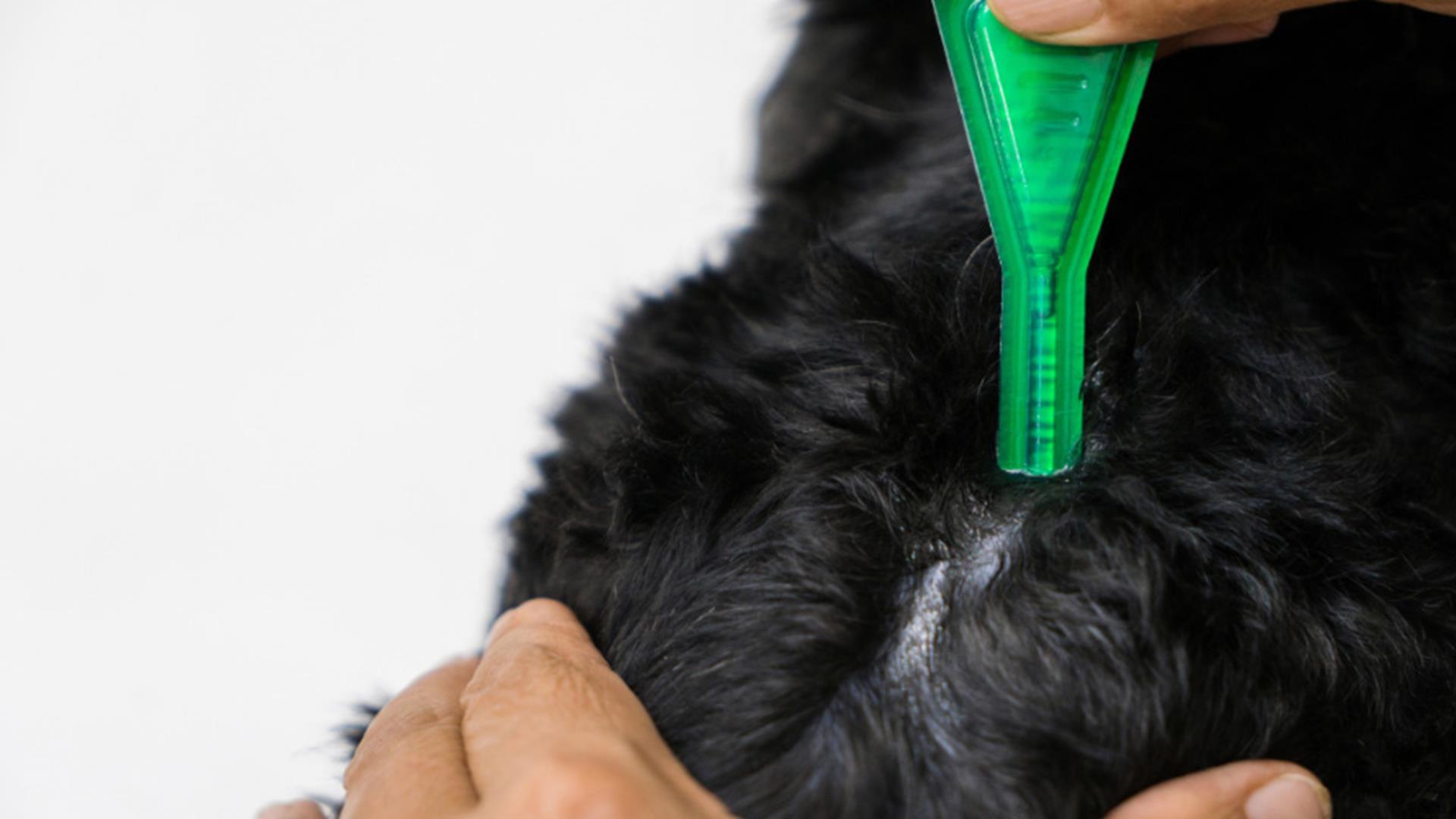How to choose the best flea & worm treatment for your dog
Overview
- There are many different flea and worm treatments available for dogs these days, which can make choosing the right one confusing – especially as most dogs need more than one product to stay protected.
- It’s important to know which parasites your dog is at risk of, then to make sure you buy a treatment that protects them completely.
- It’s also important to consider what type of product will be easiest to give – e.g. a tablet, liquid, or spot-on.
- This guide will help you decide which parasite treatment(s) to use on your dog, and where to buy them.

Checking your dog’s parasite risk
The parasites your dog is at risk of catching depends on their age, lifestyle, location, and the animals they live with. The best way to check your dog’s parasite risk is to speak to your vet, or use a reputable online UK parasite risk checker. As a general rule, most dogs in the UK should be regularly treated for:
Then, depending on where you live and their lifestyle, you may also need to treat them for:
Going on holiday?
If you plan to take your dog on holiday, it’s important to research the parasite risk for the area you’re visiting, and protect your dog accordingly. Lungworm and ticks are a particular risk in certain areas of the UK. If you are travelling overseas, it is best to contact your vet for tailored advice on parasite risks for the country you are travelling to.
Prescription vs non-prescription treatments
Where possible, it’s best to stick to parasite treatments that have been prescribed by your vet. However, if this isn’t possible, it’s important to understand the other types of treatment available, and how to select one that suits your dog. Below is a brief summary:
Prescription treatments
- A prescription parasite treatment can only be prescribed by your vet, and for this to happen they need to physically check your dog, assess their individual health needs and advise you on the most suitable treatment.
- Once your vet has prescribed a treatment, you can choose to buy it directly from them, or from a registered online pharmacy (using the prescription they have written for your dog).
- Prescription parasite treatments are extremely likely to be effective and safe if used correctly.
- We advise using prescription parasite treatments wherever possible.
Non-prescription treatments
There are two main types of parasite product that don’t require a vet prescription:
1. Treatments that require your pet’s details
- This type of product can be bought from a vet practice, online pharmacy, or from a locked cabinet in a human pharmacy or pet shop.
- To buy this type of treatment, you will need to provide the retailer some details about your dog, such as their name, age, breed, weight, and when they last had a parasite treatment. The retailer will then use these details to check the product you are buying is safe for your dog.
- How effective these treatments are varies – some work very well, others less so. These treatments may not be suitable for all pets or situations, and may not consider individual health problems.
2. ‘Off-the-shelf’ products
- This type of product can be picked up off-the-shelf in supermarkets, corners shops, human pharmacies, pet shops and on online pharmacies.
- They can be sold by anyone, and have no restrictions – meaning you don’t need to provide any details about your pet.
- These products are often less reliable and less effective than prescription products, and as a result may not get rid of fleas and worms.
- Not all treatments will be suitable for your dog as an individual, especially if they have any health concerns.
Where to buy your dog’s parasite treatment
Your vet practice
- Your vet clinic is a great place to buy your dog’s flea, tick and worm treatments. They will stock a range of reliable treatments, and be able to give you advice about which ones to use and how often.
- Vet practices tend to mainly stock prescription treatments - which require your dog to be seen, and non-prescription treatments - which require you to give some details about your dog.
- As mentioned above, where possible we advise buying prescription parasite products for your dog.
Online pharmacies
- Online pharmacies are also a good place to buy parasite treatments, however, they stock a wide range of products that vary in effectiveness - so it’s important to know what you’re looking for.
- First, check that the website you are buying from has been checked by the Veterinary Medicines Directorate (VMD), if they have been, they will display the VMD logo which guarantees all products on their website have been safety tested.
- Then, when buying online, our vets recommend sticking to products that require a prescription from your vet, or products that require you to provide details about your dog.
- We don’t advise buying ‘off-the-shelf’ products (that can be bought without providing any of your pet’s details) because they can be much less reliable.
Pet shops and human pharmacies:
- Pet shops and human pharmacies can’t sell prescription products because there is no vet on site. Instead, they tend to stock a range of non-prescription products that vary in effectiveness so, again, it’s important to know what you’re looking for.
- If buying from a pet shop or human pharmacy, stick to the type of products that come from a locked cabinet and require you to provide details about your dog.
- We advise against ‘off-the-shelf’ products that can be purchased without providing any of your pet’s details because they can be much less reliable.
Supermarkets and other shops
Supermarkets and other types of shop such as corner shops usually only sell ‘off-the-shelf’ products that don’t require any information about your pet – our vets don’t recommend buying these products as they can be unreliable.
Another important consideration when choosing a parasite product for your dog is which type of medication will be easiest to give. Luckily, there are several different types:
- Spot-on pipette – small vials of liquid, applied to the skin, usually on the back of the neck. Some dogs won’t notice you applying a spot-on, whereas others are wrigglier which can make applying one tricky. Check out our video below for help on how to apply this to your dog.
- Tablet or chew - can work well if your dog loves their food as some are flavoured, or can be hidden in a treat.
- Liquid or paste – can be put directly into your dog’s mouth or mixed with food.
- Collars – with one exception, flea collars tend to be less effective than the other options.
 Video found at youtu.be/clRQBXw23gk
Video found at youtu.be/clRQBXw23gk
Preventing side effects
Side effects from parasite medications are rare, and tend to be very mild when they do happen. Common side effects include:
- Itchy skin, hair loss and sores where a ‘spot-on’ product is applied
- Low energy
- Vomiting
- Diarrhoea
- Drooling
- Reduced appetite
There are a few things you should check before giving a parasite medication to keep your dog’s risk of side effects as low as possible.
Is the product suitable for your dog’s age?
Certain products are only suitable from a certain age, for example not all products are suitable for puppies less than 8 weeks old.
Is the product suitable for your dog’s weight?
Make sure you have the right dose of product for your dog’s current weight.
Is the product suitable for your dog’s breed?
Some parasite treatments can cause side effects in certain breeds of dog, for example Border Collies can’t tolerate an ingredient called Ivermectin.
Has your dog had previous reactions?
Has your dog had any previous reactions to medications? If so, don’t give them any products that contain the same active ingredients.
Are there any other animals in the house?
Some dog flea products contain permethrin which is toxic to cats, fish and birds.
Always speak to your vet if your dog has any side effects, they will advise you what to do, and might recommend a different product for next time – the chances are that your dog will be perfectly fine with a product that has different ingredients. If necessary, your vet will also report your dog’s side effects to the Veterinary Medicines Directorate (VMD). Serious side effects are extremely uncommon but if your pet develops any, contact your vet immediately.
- Can I use natural flea and worming treatment for my dog?
- Can I use a flea collar?
- How often should I treat my dog for parasites?
- Can you give flea, tick and worming treatments together?
- Can I use flea shampoo to treat fleas on my dog?
- Do I have to treat other animals in the same house?
- Can fleas live on humans?
- How do I get rid of fleas in the house?
Can I use natural flea and worming treatment for my dog?
There is no evidence that natural flea treatments such as diatomaceous earth, apple cider vinegar, garlic, or essential oils can be used to treat fleas. Garlic is toxic to dogs and cats so should never be used as a flea treatment, and many essential oils are also poisonous for cats.
Can I use a flea collar?
Apart from one exception, our vets don’t recommend flea collars because they don’t tend to be very effective. One exception is a ‘flea and tick’ collar containing ‘Imidacloprid’ and ‘Flumethrin’, which has been safety tested and proven to work for seven to eight months once fitted to your pet. This collar can only be bought directly from vets, online pharmacies, and some human pharmacies/pet shops (from a locked cabinet). It’s non-prescription, but requires details about your pet before you can buy it.
How often should I treat my dog for parasites?
How often you need to treat depends on what product you’re using and what parasites you’re treating for. If you bought your dog’s treatment from your vet then follow their advice on when to treat your pet, otherwise follow the instructions in the packet of your flea, worm, or tick treatment.
Can you give flea, tick and worming treatments together?
Yes, some flea, tick and worm products are fine to give together, but always check with your vet beforehand. If it’s the first time your dog is having the treatment, your vet team might recommend leaving a few days between different products in case any of the products cause side effects. Although side effects are very rare, leaving a few days in between them will allow you to know which product could have caused an issue.
Can I use flea shampoo to treat fleas on my dog?
Unfortunately flea shampoos often aren’t effective at killing fleas.
Do I have to treat other animals in the same house?
Alongside treating your dog, you will need to treat any other dogs, cats, and rabbits in the house. You will also need to treat the house with a household flea spray to kill any eggs that can develop into adult fleas. It is also necessary to wash any pet bedding at 60°C.
Can fleas live on humans?
No, dog fleas typically do not live on humans. While they may bite humans, they cannot live permanently on humans.
How do I get rid of fleas in the house?
The best way to get rid of fleas in the house is through vacuuming followed by the use of a household flea spray.
Published: January 2024
Did you find this page useful?
Tell us more
Please note, our vets and nurses are unable to respond to questions via this form. If you are concerned about your pet’s health, please contact your vet directly.
Thank you for your feedback
Want to hear more about PDSA and get pet care tips from our vet experts?
Sign up to our e-newsletter
Written by vets and vet nurses. This advice is for UK pets only. Illustrations by Samantha Elmhurst.



